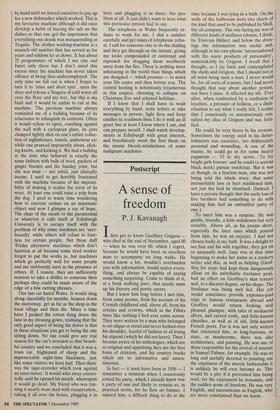Postscript
A sense of freedom
P. J. Kavanagh
Ifirst got to know Geoffrey Grigson who died at the end of November, aged 80 — when he was over 60, which I regret, because he would have been an excellent man to accompany on long walks. He would know a lot, wouldn't overburden you with information, would notice every- thing, and always be capable of saying something surprising. Come to think of it, at a brisk walking pace, that nearly sums up his literary and poetic career.
But I knew him long before I met him, from some poems, from his account of his Cornish childhood and, above all, from his articles and reviews, which in the Fifties were like nothing I had ever come across. They were written by a man who belonged to no clique or trend and never looked over his shoulder, fearful of fashion or of losing his stipend (which he did not have). Then I became aware of his anthologies, which are so original and appetising they are the best form of criticism, and his country books which are so informative and unsen- timental.
In fact — it must have been in 1956 — I remember a moment when I consciously joined his party, which I already knew was a party of one and likely to remain so, in practical terms, for he flew no banner. I saluted him; a difficult thing to do at the time because I was lying in a bath. On the walls of the bathroom were two charts of the kind that used to be published by Shell, the oil company. The one facing me was of different kinds of molluscs (drawn, I think, by Tristram Hillier) and below the draw- ings the information was useful and, although in his own phrase 'unencumbered with the waste products of personality', unmistakably by Grigson. I recall that I thought, as I lay back and contemplated the shells and Grigson, that I should not at all mind being such a man. I never would be, for all sorts of reasons, but I had never thought that way about another person, nor have I since. It affected my life. Ever after, when confronted by a confusion of loyalties, a pressure of fashion, or a disin- clination to say what I really felt, I realise that I consciously or unconsciously con- sulted my idea of Grigson and was forti- fied.
He could be very fierce in his reviews. Sometimes the energy used in his demo- lishments was excessive, too deliberately personal and wounding. A son of the manse, he could go in for some hearty paganism — '0 to dry never, / To lay bright girls forever' and he could (a serious black mark) pursue vendettas. But it was as though, in a fearless man, one was not being told the whole story, that some inconsolable loss or hurt maddened him, not just the fool he chastised. (Indeed, I have a private thought that the early loss of five brothers had something to do with making him feel an embattled party of one.) To meet him was a surprise. He was gentle, friendly, a little withdrawn but very sociable. Above all, as his poems show, especially the later ones which poured from him, he was an enjoyer. I had not chosen badly in my bath. It was a delight to see him and his wife together, they got on so unusually well. Jane was at that time beginning to make her name as a cookery writer and this, as well as helping (Geof- frey for years had kept them dangerously afloat on his unbribable freelance pen), had an effect on Geoffrey's skin texture and, to a discreet degree, on his shape. The freelance was being well fed. Her job would sometimes provide expenses-paid trips to famous restaurants abroad and Geoffrey would return looking well pleased, plumper, with tales of mediaeval alleys, and carved roofs, and little-known churches, as well as of old, little-known French poets. For it was not only writers that interested him, or long-barrows, or stars, or mushrooms, there was also architecture, and painting. He was one of those responsible for the revival of interest in Samuel Palmer, for example. He was so long and usefully devoted to pointing out the emptiness of the merely fashionable it is unlikely he will ever become so. This would be a pity if it prevented him being read, for the enjoyment he transmits, and the sudden sense of freedom. He was very English, and unconstrains us English, who are more constrained than we know.


































































 Previous page
Previous page